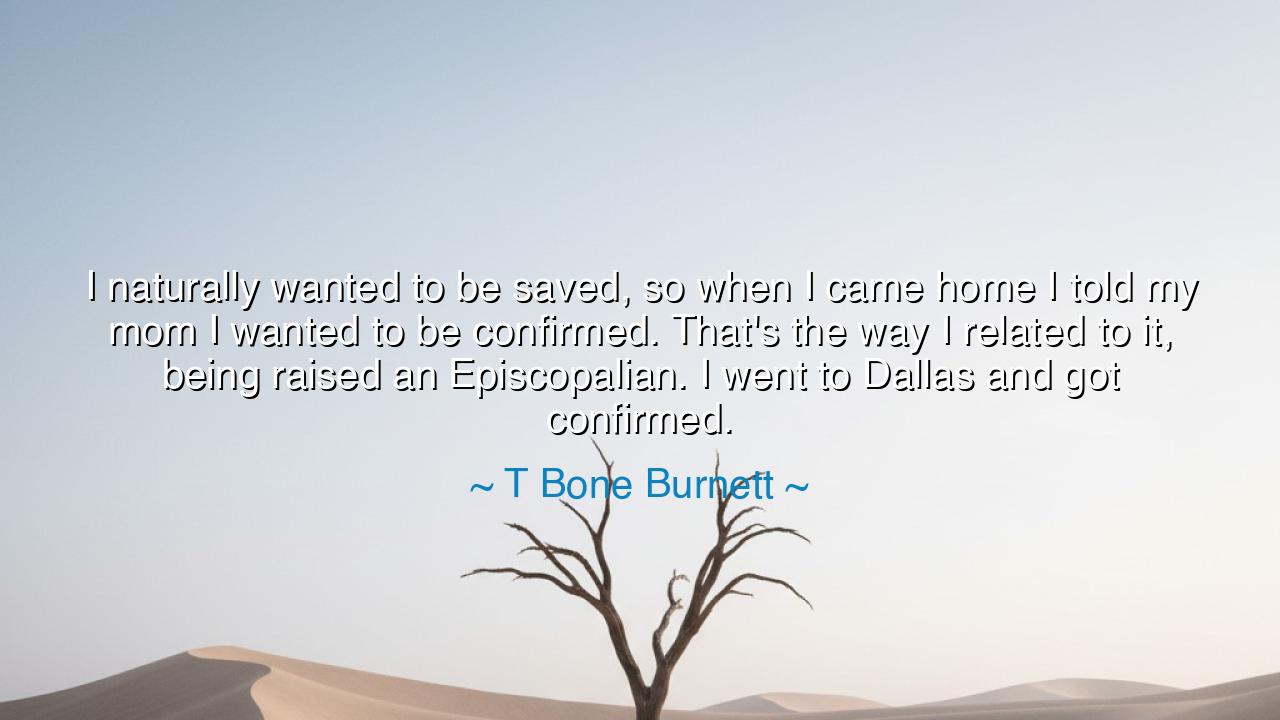
I naturally wanted to be saved, so when I came home I told my mom
I naturally wanted to be saved, so when I came home I told my mom I wanted to be confirmed. That's the way I related to it, being raised an Episcopalian. I went to Dallas and got confirmed.






Hear, O seekers of the spirit, the testimony of T Bone Burnett, musician and pilgrim of the soul: “I naturally wanted to be saved, so when I came home I told my mom I wanted to be confirmed. That's the way I related to it, being raised an Episcopalian. I went to Dallas and got confirmed.” These words are not the hollow recollection of ritual, but the confession of a soul that yearned for light, for belonging, for the hand of God upon its life. It is the story of a child who desired salvation not as a theory, but as a lived reality, and who found in confirmation the visible seal of an inward longing.
The meaning of this saying is rooted in the eternal hunger of the human heart. To “be saved” is to yearn for redemption, for safety from despair, for a place in the eternal order. Burnett, raised within the Episcopal tradition, saw in confirmation not merely a rite, but a bridge between his youthful longing and the holy mystery of belonging to God’s family. For many, the forms of faith may seem ordinary—prayers, ceremonies, sacraments—but for the one who yearns, these become sacred gateways through which the soul enters into communion with the divine.
From the earliest days, mankind has sought such rituals of belonging. In ancient Israel, the people marked themselves with covenantal signs, circumcision for the sons of Abraham, the Passover lamb as protection from death. In the Christian faith, baptism and confirmation became the sacred milestones of the journey, marking not only identity but intention. What Burnett experienced in Dallas is but one echo of a universal truth: the heart seeks to be bound, to be named, to be saved.
Consider also the life of Augustine of Hippo, who as a young man wandered in confusion, chasing after pleasure and philosophy. Yet his heart was restless until it rested in God. His baptism at the hands of Ambrose was not a mere formality but the fulfillment of a long and painful searching. Like Burnett’s confirmation, it was the visible sign of an inward desire: the natural longing to be saved. Both stories remind us that behind every ritual lies a living flame—the human desire for redemption and meaning.
Yet Burnett’s words also reveal something deeply personal: salvation, though universal in longing, is always experienced in a specific way, through the culture, the family, the faith that raises us. For him, as an Episcopalian, confirmation was the way he could grasp and express what burned within him. Others may find different forms—pilgrimage, prayer, fasting, devotion—but the essence is the same: a cry from the soul to be bound to something greater than itself. The outward path may differ, but the inward hunger is shared by all.
The lesson for us is clear: honor the longing for salvation that stirs within you. Do not dismiss it as childish or naive, for it is the deepest truth of your being. Seek the forms of faith that speak to your soul, and let them shape your life. Do not scorn the rituals of tradition, for though they may seem ordinary, they hold the power to transform when embraced with sincerity. The child who asks to be confirmed, the seeker who kneels in prayer, the pilgrim who sets out on the road—all are answering the same eternal call.
As for practical action, reflect on your own journey. Ask yourself: What is my confirmation? Where have I declared my belonging? If you have not yet done so, seek out the practices, the communities, the commitments that give voice to your longing. Do not be content to debate salvation as an idea—live it as a reality. And if you have already walked this path, remember your vows and renew them in your heart, for the journey of salvation is not completed in one moment but lived day by day.
Thus, the words of Burnett shine with quiet power: “I naturally wanted to be saved.” This desire is not his alone, but the cry of every human soul. And whether through confirmation in Dallas, baptism in Rome, or prayer whispered in the desert, it is the same longing that has moved humanity through the ages—the longing to be bound to love, to truth, and to eternity. May we hear that longing in ourselves and answer it with courage and faith.






AAdministratorAdministrator
Welcome, honored guests. Please leave a comment, we will respond soon